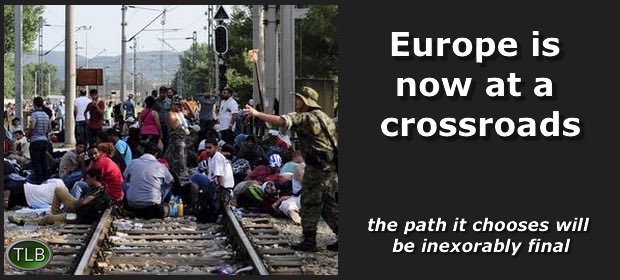
EUROPE AND THE MIGRANT WARS
DR. ALAN NED SABROSKY
Europe is at war, and it is not the usual kind of war.
Perhaps the only historical precedent to the migratory war from Africa and the Middle East is the migration westward of various peoples fleeing the depredations of the Huns in the 4th and 5th centuries A.D. That did not end well for then-Roman Europe, ushering in centuries accurately termed the Dark Ages. But there is a difference now. Today many governments welcomed the migrants (at least at first) and did not really try to repel them; and this time, if Europe fails to recover its balance and expel the migrants, there will not be any Renaissance to recover from the New Dark Ages that will inevitably ensue.
The Migrant Crisis
The broad details of the migrant crisis are well enough known not to require elaboration here, but there are some often overlooked nuances that do. To speak of “refugees” and “migrants” interchangeably is both deceptive and wrong. There are in fact three distinct categories of these immigrants, although all three are not found in all countries. One (and potentially if not actually the most stable) are those who either came from former colonies (Britain and France stand out here) or were deliberately brought in as workers (the largely Turkish Gastarbeiter in Germany come to mind), who have been in residence for generations, often hold citizenship, and for whom finding work and a home have traditionally been important for many.
 Another are migrants, largely single males from Sub-Saharan Africa and parts of the Middle East, principally arriving because of a fascinating collusion between human traffickers and NGOs. Most of these evince little interest in making stable homes and finding work, and appear to want only welfare and women – not necessarily in that order. And the last are the genuine refugees fleeing war. These include both single males and family groups, largely from the Middle East (Libya, Syria, Afghanistan, Iraq, Eritrea and Somalia stand out), virtually all from countries that have been shattered by US and European armed forces for no better reason than that they were on Israel’s list of enemies – a list that includes Iran, the only one not yet openly attacked.
Another are migrants, largely single males from Sub-Saharan Africa and parts of the Middle East, principally arriving because of a fascinating collusion between human traffickers and NGOs. Most of these evince little interest in making stable homes and finding work, and appear to want only welfare and women – not necessarily in that order. And the last are the genuine refugees fleeing war. These include both single males and family groups, largely from the Middle East (Libya, Syria, Afghanistan, Iraq, Eritrea and Somalia stand out), virtually all from countries that have been shattered by US and European armed forces for no better reason than that they were on Israel’s list of enemies – a list that includes Iran, the only one not yet openly attacked.
The initial response from the EU and individual European countries varied widely. The politicrats of the EU in general have been strongly supportive of opening borders and welcoming migrants and refugees. Some European countries such as Sweden and Germany have been especially welcoming, while others – such as the Visegrad Group (Poland, Hungary, Slovakia, the Czech Republic) have been hostile to the idea – often in the face of extreme hostility from the EU itself. And the responses of still others fell between the two extremes, in some cases such as Italy and now Slovenia simply being in the forefront of the migration path.
It quickly became apparent that however welcoming governments might be, the arrival of growing numbers of migrants – perhaps as many as 75% of whom are single males of military age – did not exactly usher in a period of peace and tranquility within any country from Britain across the Continent that accepted them. Migrants and refugees alike professed a desire for a better life, but they brought with them epidemics of crime – including riot and rape – the establishment of what are euphemistically  called “no-go zones” which even police enter at their peril – and urban decay. This ought not to surprise anyone, since the migrants themselves are the principal reason their home countries are what President Trump ungraciously but accurately called “shitholes,” and there was and is no reason to expect them to act differently in Europe. But it is a strange way for people seeking succor to treat places that genuinely if unadvisedly welcomed them.
called “no-go zones” which even police enter at their peril – and urban decay. This ought not to surprise anyone, since the migrants themselves are the principal reason their home countries are what President Trump ungraciously but accurately called “shitholes,” and there was and is no reason to expect them to act differently in Europe. But it is a strange way for people seeking succor to treat places that genuinely if unadvisedly welcomed them.
Not surprisingly, the public response across Europe has largely been far less enthusiastic than that of the EU or the national governments that initially welcomed these migrants and refugees. Movements of varying size and activism have arisen in most countries where migrants have taken root. Germany in particular has the “#120db” movement started by women and girls who see their government victimizing them for the sake of the migrants, as portrayed in a chilling video:
The Widerstand Deutschland also has support, while a political party – the Alternativ fur Deutschland (AfD) rode a strongly anti-migrant stance to become the third largest party in Germany in the last elections. And the Visegrad Group, the Baltic states and even Russia – seeing what has been happening from Britain to Germany and from Italy to Sweden – have dug in their heels in opposition to anything even hinting at policies or practices to bring Middle Eastern and African migrants or refugees into their societies. They clearly consider the presence of growing numbers of such people as hostile to both public order and their own cultures – and they are correct.
In the face of growing public opposition, the EU has demonstrated the truth of the maxim that a fanatic is someone who redoubles their efforts when they have lost sight of their original goals, reaffirming their commitment to make places for these migrants and pressuring countries that refuse to take them in. National governments facing elections have had a more varied response. Indeed, many liberal/socialist governments in Europe have made some accommodation to the rising unhappiness of their electorates with the migrant problem. But these are merely tactical accommodations, and do not represent a fundamental reorientation of strategy. As existing migrant/refugee populations grow in size and voting strength, expect them all to gradually resume their “open borders – migrants welcome” approach.
But What Does it Mean?
At a minimum, the presence of large numbers of these migrants in any European country means internal disorder, growing criminality and a clash of cultures that will increasingly compromise the indigenous European cultures. These are not simply abstractions. None of the Sub-Saharan countries nor the more primitive of the Middle Eastern societies (e.g. Afghanistan) have any common cultural traditions with modern Europe – concepts such as participatory democracy, women’s rights, and the rule of law are simply alien to them. To call them “backward” – however politically incorrect it may be – is at best an understatement, and the implications of that for Europe proper cannot be casually dismissed.
In a sense, Europe is entering a phase similar to that in which the US is mired. Both the US and Europe have, or have evolved, minority groups that do not share the values of the dominant culture. In the US, it is principally African-Americans and secondarily some Latinos; in Europe it is principally the residue of the assorted colonial empires, largely from Africa (including North Africa) and South Asia. Both the US and Europe also have new arrivals, legal or otherwise, largely Latinos from Mexico and Central America in the case of the US and refugees or migrants in the case of Europe, the former principally from the Middle East and the latter largely from Africa.
In all cases, there are certainly people from those minority groups who are good citizens and good neighbors, but at least in the US the larger part of those minority groups are neither, committing a disproportionate number of crimes, largely dependent on welfare, and blighting neighborhoods and cities where they predominate numerically. These pictures, of Detroit (top) and Baltimore (bottom), give an all too stark image of the consequences of this development – something those of us in the early civil rights movement never anticipated. There remain good areas in these cities, but the blight predominates:

Figure 1 – Detroit

Figure 2 – Baltimore
This is the future that awaits Europe if you let the migrant invasion succeed. We in the US never expected it. I doubt any of your political leaders anticipated what the influx of migrants would produce. In both the US and Europe, the media largely refuse to confront these realities – it runs too counter to their preferred political narrative. The difference is that in the US, it is politically impossible for any politician of any party to speak bluntly about the situation and what must be done to deal with it – recognizing that there are no longer any positive solutions, only punitive ones. In the case of Europe, it is difficult or impossible for most elected governments to do likewise – but political and other alternatives still exist there. Europe facing its Migrant War has better prospects than the US confronting its own minority morass.
Riposte: The Political Dimension
No reassessment of Europe’s prospects in the Migrant War can escape a critical look at the EU apparatus. It is not that the EU itself is necessarily a bad idea in the political dimension. It is that the EU policy on migrants and refugees is incompatible with the stated goals of the EU for  Europe, and undermines the viability of the member states themselves. The states in the Visegrad Alliance (Poland, Hungary, Slovakia and the Czech Republic) appear to understand this, and as a consequence are having little or nothing to do with what the EU wants on this issue. So, too, must the rest of Europe – and it should stand ready to assist smaller countries such as Slovenia facing their own migrant invasion.
Europe, and undermines the viability of the member states themselves. The states in the Visegrad Alliance (Poland, Hungary, Slovakia and the Czech Republic) appear to understand this, and as a consequence are having little or nothing to do with what the EU wants on this issue. So, too, must the rest of Europe – and it should stand ready to assist smaller countries such as Slovenia facing their own migrant invasion.
The multi-racial, multicultural agenda being pressed by EU politicrats is a prescription for disaster, as is its analog in the US. What possible advantages accrue to any European country (or to the US, for that matter) from admitting and giving residence to large numbers of migrants and refugees, or empowering existing minorities, whose cultures are largely hostile to the values of Western civilization? What that agenda is cannot be ignored – it is less multi-racial than uni-directionally racial, emphasizing the mixing of white females with African (and occasionally Middle Eastern) males but not white males with the others. What is not so clear is why the political Left in Europe and in the US is pushing an agenda that can only undermine the existing cultures there, without which those countries fail.
Further, the migrant issue needs to be treated not as a matter of immigration, relief and social justice, but as a security matter requiring a firm, collective response – no matter how much the EU as it is currently constituted might object. Multinational forces are the key here, since some countries bear the brunt of the migrant invasion. For example, intercepting incoming boats/ships with migrants requires a consistent procedure: warn 5km from territorial waters, warn a second time at 1km from territorial waters if the vessel holds to its course, warn a final time if or when the vessel crosses into territorial waters, then at 1km inside territorial waters sink the vessel. I doubt it will have to be done more than once – no matter what NGOs or well-heeled individuals are willing to pay, ship captains and crews will not take the pay and the job if it means their own lives.
Third, many of the genuine refugees from the Middle East have been driven to Europe by American-led, Israeli-instigated wars that have devastated their homelands. Europeans can empathize with their plight without feeling or being compelled to be victimized by them. None of these Middle East wars have been in Europe’s interest, none of the countries attacked have actually threatened the security of any European country, and ending any involvement in them, or endorsement for them, would be a good first step for every country in Europe to take.
Fourth, it needs to be understood that no country in Europe can be permitted to have a policy of open borders and more or less unrestricted acceptance of migrants. This is because if Europe as a whole permits this cancer to take root anywhere, it will inevitably eventually spread to infect other countries. The Visegrad countries, for example, have this mostly right (no pun intended), but it won’t help them much if (e.g.) Germany goes under. Put bluntly, no country in Europe can survive three or four more years of pro-migrant governments without collapsing beyond any hope of recovery. This is understood in some places but not in all, as elections last year demonstrated. All Europe needs to treat the migrant invasion like a gangrenous wound – heal if possible, amputate if healing is infeasible.
Fifth, multinational naval and military forces – not necessarily under either the EU or NATO – are the way to go, and with luck, many countries will see such cooperation to be in their own self-interest. Focusing initially on one country within Europe and one maritime theater along Europe’s periphery would be prudent, allowing greater concentration of forces and effort than attempting to implement a military and naval solution everywhere at once. The leaders of the Bundeswehr, for instance, ought not to be too proud to ask for military assistance from their neighbors to the East who have largely foregone the West’s migrant-refugee dementia. Poland, Hungary, Slovakia, the Czech Republic, and Russia – yes, even Russia – might help. Not out of altruism, but with the knowledge that the internal collapse of Western Europe and especially Germany will inevitably have grave consequences for them, too. WWII is over. So is the Cold War, except, perhaps, in the minds of some Americans. But the Migrant War is here and now – it merits a collective response which the EU is too spineless politically to provide.
Similarly, a small multinational naval force with a warship or two from each of several countries (much like the old Standing Naval Force Atlantic of Cold War days) deployed in the Mediterranean and Adriatic seas could stop seaborne migrants dead in their tracks – both literally and figuratively. But make no mistake about it: once deployed, the forces would have to act decisively or the response would collapse utterly. Half-measures are worse than useless in such a venture.
And more than a few migrants are deeply involved in organized crime, especially drugs and prostitution. Fine. Almost every European country has some excellent special forces units. Let them go against the organized criminal elements and kill them, while the regular armed forces crush riots, help police incarcerate or kill the rapists, and excise the migrant rot.
Europe: Ruthless or Ruined
So let us summarize what needs to be done:
- Either remake the EU directorship or disregard its dictates on these matters. Whatever its other (and somewhat problematic) value in other areas, on this set of issues the EU as it is currently constituted is a major part of the problem and no part at all of any practical solution to it. If it mandates quotas, disregard them. If it dictates fines for non-compliance, do not pay them. If it issues formal rebukes, ignore them. And if the EU attempts anything else, replacing its leadership or leaving the EU itself are always options.
- The removal from office of any European government that supports open borders and/or the
 continued influx of migrants, and/or refuses to deport those migrants already in place, by any and all means necessary, including a military coup d’etat or popular revolution if normal political processes fail. This should start with the removal from office of German Chancellor Angela Merkel and her government – I expect the women of Germany could do that even without the support of the Bundeswehr. But however it is accomplished in Germany, once it is done, like-minded people in other countries will get the message – and so will their current governments.
continued influx of migrants, and/or refuses to deport those migrants already in place, by any and all means necessary, including a military coup d’etat or popular revolution if normal political processes fail. This should start with the removal from office of German Chancellor Angela Merkel and her government – I expect the women of Germany could do that even without the support of the Bundeswehr. But however it is accomplished in Germany, once it is done, like-minded people in other countries will get the message – and so will their current governments. - Redefine the migrant issue as a security and not an immigration problem, and its resolution as a military matter and not a police or social matter. Closing borders to migrants and intercepting any vessels attempting to land migrants in any European country, sinking those vessels if necessary. Multinational naval, air and land forces should be used whenever possible. This should be complemented with the deportation – voluntary if possible, forcible if not – of existing migrants from all European countries, including the elimination of current migrant enclaves and the “no-go” zones.
Are my prescriptions ruthless? Yes. Are they necessary? Yes, IF Europe in general and Germany in particular wish to avoid an otherwise inevitable descent into chaos and the concurrent gutting of their civilization and culture. No one in their right minds ought to want to see Berlin and Hamburg and other European cities go the way of Detroit and Baltimore and so many other American cities – which is what will happen if the migrant invasion is not turned back and excised from European societies. The Left in general and the world press in particular will hate you and vilify you as racists and fascists for acting decisively. But you will save Europe, and particularly Germany – the linchpin without which Europe falls.
Europe collectively and especially Germany are at a crossroads now, and whichever path they take will be inexorably final. They can be ruthless now and recover what they had before the migrant invasion occurred, or they can be restrained now and ruined forever. Choose wisely – and then strike back hard and fast.
************
About the author
Dr. Alan Ned Sabrosky (PhD, University of Michigan) is a ten-year Marine Corps veteran. He served two tours in Vietnam with the 1st Marine Division and is a graduate of the US Army War College.




